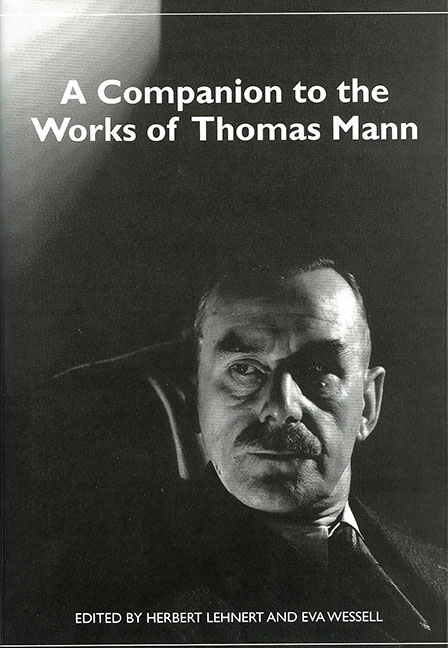Book contents
- Frontmatter
- Contents
- Foreword
- Thomas Mann's Works
- List of Abbreviations
- Introduction
- Thomas Mann's Beginnings and Buddenbrooks
- Art and Society in Thomas Mann's Early Novellas
- Love in Society: Thomas Mann's Early Stories
- “Death in Venice”
- “Mein ‘Friedrich’ — das ist was Anderes”: Thomas Mann's Unwritten Novel about Frederick the Great, King of Prussia
- Magic and Reflections: Thomas Mann's The Magic Mountain and His War Essays
- Thomas Mann's “Autobiographical” Stories
- Joseph and His Brothers
- Lotte in Weimar
- Thomas Mann's Late Politics
- “German” Music and German Catastrophe: A Re-Reading of Doktor Faustus
- The Gaze of Love, Longing, and Desire in Thomas Mann's “The Transposed Heads” and “The Black Swan”
- Felix Krull
- Female Identities and Autobiographical Impulses in Thomas Mann's Work
- Betrayed or Not Betrayed: A Testament?
- Thomas Mann's Comedies
- Notes on the Contributors
- Select Bibliography
- Index
Introduction
Published online by Cambridge University Press: 28 April 2017
- Frontmatter
- Contents
- Foreword
- Thomas Mann's Works
- List of Abbreviations
- Introduction
- Thomas Mann's Beginnings and Buddenbrooks
- Art and Society in Thomas Mann's Early Novellas
- Love in Society: Thomas Mann's Early Stories
- “Death in Venice”
- “Mein ‘Friedrich’ — das ist was Anderes”: Thomas Mann's Unwritten Novel about Frederick the Great, King of Prussia
- Magic and Reflections: Thomas Mann's The Magic Mountain and His War Essays
- Thomas Mann's “Autobiographical” Stories
- Joseph and His Brothers
- Lotte in Weimar
- Thomas Mann's Late Politics
- “German” Music and German Catastrophe: A Re-Reading of Doktor Faustus
- The Gaze of Love, Longing, and Desire in Thomas Mann's “The Transposed Heads” and “The Black Swan”
- Felix Krull
- Female Identities and Autobiographical Impulses in Thomas Mann's Work
- Betrayed or Not Betrayed: A Testament?
- Thomas Mann's Comedies
- Notes on the Contributors
- Select Bibliography
- Index
Summary
Thomas Mann's first novel, Buddenbrooks, was published in 1901, and his fame began with its second edition in 1903. Not yet thirty, he found himself a success. Before this recognition he had published vivid stories about odd characters who did not fit into ordinary society. These stories were experiments with the lives of outsiders distanced from society, from a society in which God was dead, and the proper meaning of love and death had to be re-discovered. In the novels outsiders relate to normal people. In Buddenbrooks we are shown how the distance from bourgeois society might develop. The connection between the viewpoints of outsiders and those of writers is explicit in the novellas “Tristan,” “Tonio Kröger” (both 1903), and “Der Tod in Venedig” (Death in Venice, 1912). Characters living in tension with their society are found in “Wälsungenblut” (Blood of the Walsungs, written in 1905), Joseph und seine Brüder (Joseph and His Brothers, 1933–43), Lotte in Weimar (1939), and Doktor Faustus (1947).
For Mann, society is held together by love and power, and the extraordinary individual has to reckon with both. The unstable relationship between the extraordinary individual and love, power, and society stands at the center of all of Mann's works. Another major theme, in the absence of a binding religion, is the fascination with death. In the Buddenbrook family the acquisition of wealth — that is, power — is favored over sexual love. In Königliche Hoheit (Royal Highness, 1909) an outsider's distance is healed by love. In Der Zauberberg (The Magic Mountain, 1924) a young middle-class man is thrown out of his normalcy by illicit love and curiosity about death. In “Die vertauschten Köpfe” (The Transposed Heads, 1940) a gifted Brahman and an ordinary person are friends, until sexual desire for a pretty but ordinary girl separates them, with inordinate consequences. Gregorius, the protagonist of Der Erwählte (The Holy Sinner, 1951) is what the German title says, “The chosen one.” Like all other outsiders in Mann's work, Gregorius clashes with the normal world through sexuality. The medieval model serves Mann to play with the social disapproval, the “sinfulness,” of extraordinariness. But this play with sin and human superiority is undertaken with a parodistic veneration for humane religion.
- Type
- Chapter
- Information
- A Companion to the Works of Thomas Mann , pp. 1 - 28Publisher: Boydell & BrewerPrint publication year: 2004



